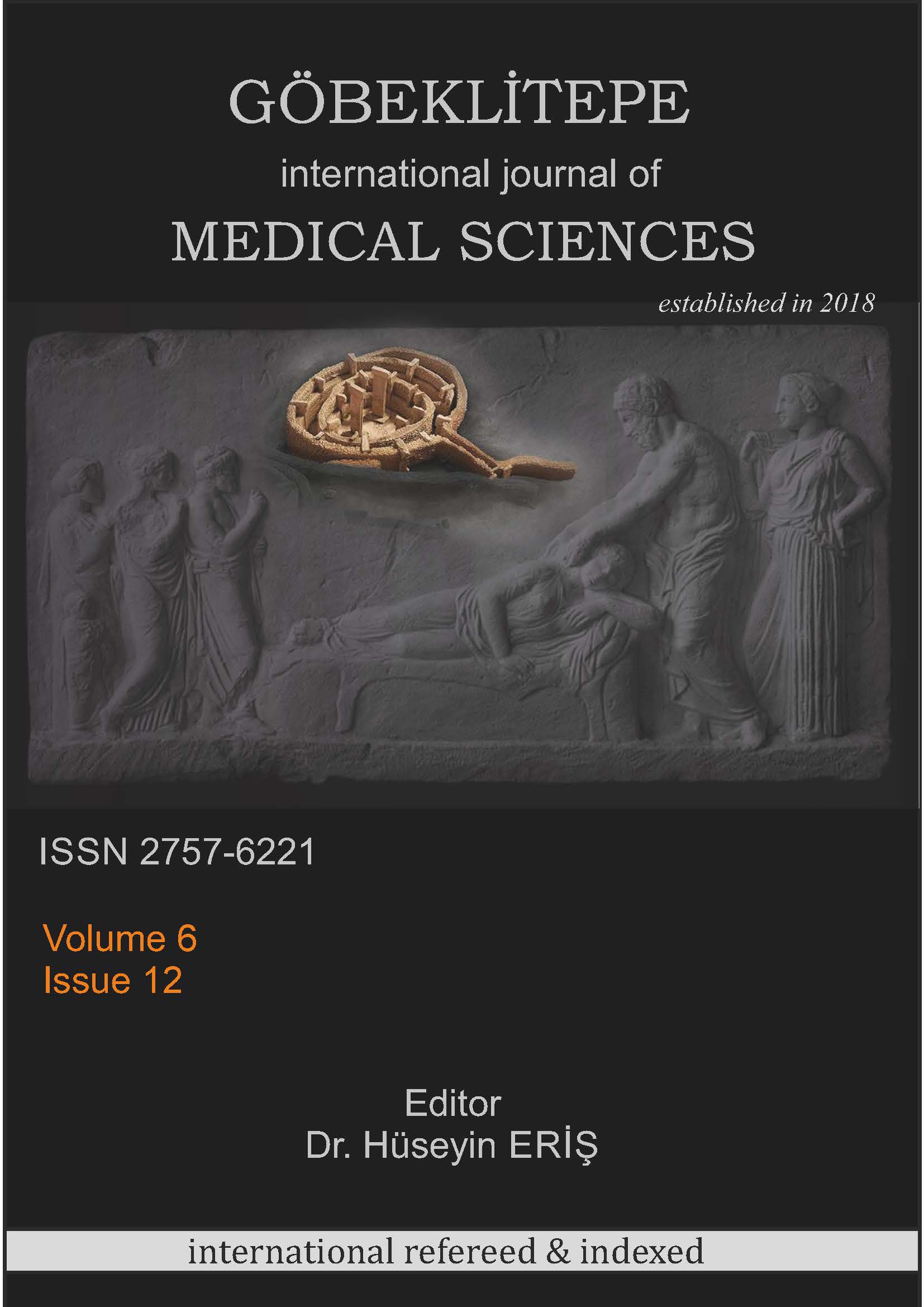DETERMINATION OF PERCEIVED STRESS LEVELS AND COPING WITH HUMOR IN CANCER PATIENTS RECEIVING CHEMOTHERAPY
Perceived Stress Levels in Cancer Patients and Coping with Humor
DOI:
https://doi.org/10.55433/gsbd/143Keywords:
kemoterapi, stres, mizah, başa çıkmaAbstract
This study aims to determine perceived stress levels and coping with humor in cancer patients receiving chemotherapy. This descriptive study was conducted in a single center in Turkey and involved a total of 135 patients who had been diagnosed with cancer. The patients receiving chemotherapy had high levels of perceived stress and their use of humor as a coping strategy in stressful situations was below average. The perceived stress scale score was statistically significantly associated with age, employment status, presence of chronic disease, frequency of chemotherapy sessions and receipt of radiotherapy (p <0.05). The coping humor scale score was statistically significantly associated with age, education, economic status, previous hospitalization and time since diagnosis (p <0.05). Increasing the awareness of patients about humor and the use of humor starting from the time of cancer diagnosis can positively affect treatment and follow-up.
References
Smith, H.R. (2015). Depression in cancer patients: Pathogenesis, implications and treatment (Review). Oncology Letters, 9(4), 1509–1514. https://doi.org/10.3892/ol.2015.2944
Seiler, A., & Jenewein, J. (2019). Resilience in Cancer Patients. Frontiers in Psychiatry, 10, 208. https://doi.org/10.3389/fpsyt.2019.00208
Dunnill, C.J., Al-Tameemi, W., Collett, A., Haslam, I.S., & Georgopoulos, N.T. (2018). A Clinical and Biological Guide for Understanding Chemotherapy-Induced Alopecia and Its Prevention. The Oncologist, 23(1), 84–96. https://doi.org/10.1634/theoncologist.2017-0263
Hopman, P., & Rijken, M. (2015). Illness perceptions of cancer patients: relationships with illness characteristics and coping. Psycho-oncology, 24(1), 11–18. https://doi.org/10.1002/pon.3591
National Cancer Instıtute. Feelings and Cancer 2021. URL: https://www.cancer.gov/about-cancer/coping/feelings
Henneghan, A., Phillips, C., & Courtney, A. (2018). We are different: Young adult survivors' experience of breast cancer. The Breast Journal. 2018; 24(6): 1126–1128. https://doi.org/10.1111/tbj.13128
Satıcı, S.A., & Deniz, M.E. (2017). Humor coping and flourishing: ınvestigating the mediating role of resilience and optimism. Elementary Education Online, 16(3), 1343-1356. DOI: 10.17051/ilkonline.2017.330262
Pinna, M., Mahtani-Chuganiz, V., Sánchez Correas, M.Á., & Sanz Rubiales, A. (2018). Theuse of humor in palliativecare: A Systematic Literature Review. The American Journal of Hospice & Palliative Care, 35(10), 1342–1354. https://doi.org/10.1177/1049909118764414
Wilkins, J., & Eisenbraun, A.J. (2009). Humor theories and the physiological benefits of laughter. Holistic nursing practice, 23(6), 349–354. https://doi.org/10.1097/HNP.0b013e3181bf37ad
Samant, R., Balchin, K., Cisa-Paré, E., Renaud, J., Bunch, L., McNeil, A., Murray, S., & Meng, J. (2020). The importance of humour in oncology: a survey of patients undergoing radiotherapy. Current Oncology (Toronto, Ont.), 27(4), e350–e353. https://doi.org/10.3747/co.27.5875
Tanay, M.A., Roberts, J., & Ream, E. (2013). Humour in adult cancer care: a concept analysis. Journal of Advanced Nursing, 69(9), 2131–2140. https://doi.org/10.1111/jan.12059
Roaldsen, B.L., Sørlie, T., & Lorem, G.F. (2015). Cancer survivors' experiences of humour while navigating through challenging landscapes--a socio-narrative approach. Scandinavian Journal of Caring Sciences, 29(4), 724–733. https://doi.org/10.1111/scs.12203
Linge-Dahl, L.M., Heintz, S., Ruch, W., & Radbruch, L. (2018). Humor Assessment and Interventions in Palliative Care: A Systematic Review. Frontiers in Psychology, 9, 890. https://doi.org/10.3389/fpsyg.2018.00890
Dean, R.A, & Major, J. E. (2008). From critical care to comfort care: the sustaining value of humour. Journal of Clinical Nursing, 17(8), 1088–1095. https://doi.org/10.1111/j.1365-2702.2007.02090.x
Sousa, L., Marques-Vieira, C., Antunes, A.V., Frade, M., Severino, S., & Valentim, O.S. (2019). Humor intervention in the nurse-patient interaction. RevistaBrasileira de Enfermagem, 72(4),1078–1085. https://doi.org/10.1590/0034-7167-2018-0609
Kovarsky, D., Schiemer, C., & Murray, A. (2011). Humor, rapport, and uncomfortable moments in interactions with adults with traumatic brain injury. Topics in Language Disorders, 31, 325–335. doi:10.1097/TLD.0b013e3182358e98
Başkaya, E., & Demir, S. (2018). A Touch to life with magical smiles: Humor therapy. Journal of Health Science and Profession, 5(3), 453-457.doi: 10.17681/hsp.34028832
Erci, B. (2006). Reliability and validity of the Turkish version of the perceived stress scale. Journal of Anatolia Nursing and Health Sciences, 9(1), 58-63.
Buiting, H.M., de Bree, R., Brom, L., Mack, J.W., & van den Brekel, M.W. (2020). Humour and laughing in patients with prolonged incurable cancer: an ethnographic study in a comprehensive cancer centre. Quality of Life Research, 29(9), 2425-2434.
Cohen, S., Kamarck, T., & Mermelstein, R. (1983). A global measure of perceived stress. Journal of Health and Social Behavior, 24(4), 385–396.
Martin, R.A., & Lefcourt, H.M. (1983). Sense of humor as a moderator of the relation between stressors and moods. Journal of Personality and Social Psychology, 45(6), 1313–1324. https://doi.org/10.1037/0022-3514.45.6.1313
Martin, R.A. (1996). The Situational Humor Response Questionnaire (SHRQ) and the Coping Humor Scale (Chs): A Decade of Research Findings, Humor: International Journal of Humor Research, 9(3-4), 251-272.doi:
1515/humr.1996.9.3-4.251
Yerlikaya, E.E. (2009). The relationship between humor styles and perceived stress, anxiety and depression of college students, Çukurova University Social Sciences Institute, Adana.
Mazor, M., Paul, S.M., Chesney, M.A., Chen, L.M., Smoot, B., Topp, K., Conley, Y.P., Levine, J.D., & Miaskowski, C. (2019). Perceived stress is associated with a higher symptom burden in cancer survivors. Cancer, 125(24), 4509–4515. https://doi.org/10.1002/cncr.32477
Ramandeep, P.S. (2019). Effect of humour therapy on psychological health of cancer patients. International Journal of Practical Nursing, 7(1), 29-35.DOI: 10.21088/ijpn.2347.7083.7119.5
Alagizy, H.A., Soltan, M.R., Soliman, S.S., Hegazy, N.N., & Gohar, S.F. (2020). Anxiety, depression and perceived stress among breast cancer patients: single institute experience. Middle East Current Psychiatry, 27(1), 1-10.
Kikuchi, N., Nishiyama, T., Sawada, T., Wang, C., Lin, Y., Watanabe, Y., Tamakoshi, A., & Kikuchi, S. (2017). Perceived Stress and Colorectal Cancer Incidence: The Japan Collaborative Cohort Study. Scientific Reports, 7, 40363. https://doi.org/10.1038/srep40363
Li, J., Gao, W., Yang, Q., & Cao, F. (2021). Perceived stress, anxiety, and depression in treatment-naïve women with breast cancer: a case-control study. Psycho-Oncology, 30(2), 231–239. https://doi.org/10.1002/pon.5555
Jan, F., Singh, M., & Nisar, S. (2021). Perceived stress in cancer patients: An integrative review. Indian Journal of Psychiatric Nursing, 8(2), 112. https://doi.org/10.4103/iopn.iopn_4_21
Rose, S.L., Spencer, R.J., & Rausch, M.M. (2013). The use of humor in patients with recurrent ovarian cancer: a phenomenological study. International journal of gynecological cancer: official journal of the International Gynecological Cancer Society, 23(4), 775–779. https://doi.org/10.1097/IGC.0b013e31828addd5
Johnson, E.M., & Ross, D.B. (2021). The Cost of Cancer: The Association of Financial and Cancer-Related Stress on Maladaptive Coping Styles in Families with a Cancer Diagnosis. Contemporary Family Therapy, 1–10. Advance online publication. https://doi.org/10.1007/s10591-021-09595-5
Vancampfort, D., Koyanagi, A., Ward, P.B., Veronese, N., Carvalho, A.F., Solmi, M., Mugisha, J., Rosenbaum, S., De Hert, M., & Stubbs, B. (2017). Perceived Stress and Its Relationship with Chronic Medical Conditions and Multimorbidity Among 229,293 Community-Dwelling Adults in 44 Low- and Middle-Income Countries. American Journal of Epidemiology, 186(8), 979–989. https://doi.org/10.1093/aje/kwx159
Karamadi, M., & D Silva, C. (2020). Perceived Stress and Life Satisfaction among Adults with and without Chronic Illness. International Journal of Creative Research Thoughts (IJCRT), 8(3), 2848-2851.
Barre, P.V., Padmaja, G., Rana, S., & Tiamongla. (2018). Stress and quality of life in cancer patients: medical and psychological intervention. Indian Journal of Psychological Medicine, 40(3), 232-238.
Miceli, J., Geller, D., Tsung, A., Hecht, C. L., Wang, Y., Pathak, R., Cheng, H., Marsh, W., Antoni, M., Penedo, F., Burke, L., Ell, K., Shen, S., & Steel, J. (2019). Illness perceptions and perceived stress in patients with advanced gastrointestinal cancer. Psychooncology, 28(7), 1513-1519.
Richards, K., & Kruger, G. (2017). Humor styles as moderators in the relationship between perceived stress and physical health. Sage Open, 7(2), 1-8.https://doi.org/10.1177/2158244017711485
Downloads
Published
Versions
- 2024-07-02 (2)
- 2023-06-27 (1)
How to Cite
Issue
Section
License
Copyright (c) 2023 Göbeklitepe Sağlık Bilimleri Dergisi

This work is licensed under a Creative Commons Attribution 4.0 International License.




